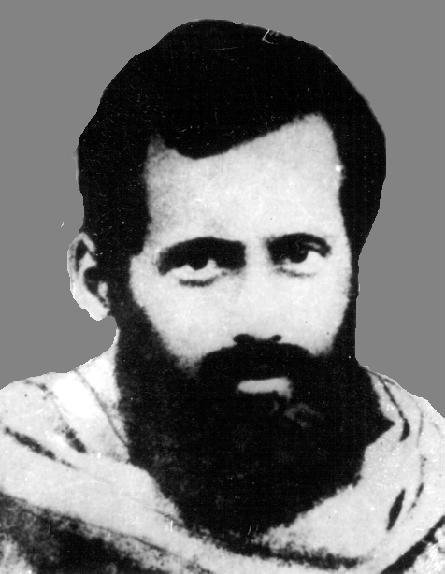
Gopabandhu Das (1877-1928) was a symbol of Oriya identity, popularly known as Utkal Mani, he devoted his entire life to the cause of Orissa, in particular, and India, in general. The environment of his time conditioned his thinking and inspired him to restore the lost glory of Orissa. The period was marked by awakening of nationalist forces in Orissa, the introduction of western education and rise of Indian Renaissance.
Gopabandhu was born on 9th October, 1877 in a village called Suando in Satyabadi Police Station in the district of Puri. He lost his mother after his birth and it created a void in his heart. He started his education in the village Pathashala. He developed interest in writing poems from childhood. During his school days in Puri Zilla School, he came in close contact with M. Rama Chandra Das, a man of impeccable character and intense patriotism, who infused in him a strong sense of dedication to public service. Under his influence, he was imbuded with deep sense of patriotism.
During his studentship in the school, Cholera broke out during the car-festival of Lord Jagannath which took away heavy toll of lives. Gopabandhu organised his friends and formed Puri Seva Samiti. This was his first experience in public service.
While pursuing his study in the Ravenshaw College, he alongwith his friends like Brajasunder Das and Acharya Harihar Das made a commitment to serve the poor and the destitutes. While his son was seriously ill, he got the report of flood in the interior area of the district. He ignored the serious illness of his son and went to the flood affected people to provide them relief.
During his absence, his son died. He said : There are so many to look after my son. What more can I do ? But there are so many people crying for help in the affected areas and it is my duty to go there. Lord Jagannath is here to take care of the boy.Further, the day he got the news of his success in Law Examination, Calcutta, his wife died. He was having unique personality of simplicity, sacrifice, tolerance and commitment.
Gopabandhu started his career as a lawyer at Puri. In 1909, Madhusudan Das, appointed him as the State pleader of the State of Mayurbhanj. Maharaja Shri Rama Chandra Bhanja Deo had high regards for him.
As an educationist, Gopabandhu realised that without education, people would not be conscious of their freedom and duty towards nation. In this regard, he was greatly influenced by the work of the Deccan Education Society under the leadership of Gopal Krishna Gokhale. As a result, a school was established at Satyabadi in the district of Puri. Gopabandhu bacame the Secretary of the school. The reputed intellectuals of that time like Pandit Nilakantha Das, Pandit Godavarish Misra, Acharya Harihar Das, Pandit Krupasindhu Mishra, Pandit Basudev Mohapatra and Shri Ramachandra Rath offered their service.
Teaching was imparted in a natural environment i.e. under the shades of trees. The students were taught the values of secularism,nationalism and idealism. What deserves a special mention that the dignity of labour became the principle of life for both the students and teachers. Gopabandhu set up a fund called The Orissa Education Fund with Mr. Labert, the Principal of Ravenshaw College as the treasurer. He was a member of the senate and syndicate of the Patna University. His model of education was a combination of ideals of both western and Indian model of education.
As regards his political career, Gopabandhu was a member of the Old Bihar and Orissa Legislative Council for four years from 1917 to 1920.
He emphasised on four major problems, viz, (a) amalgamation of all the Oriyaspeaking tracts (b) permanent measures for the prevention of floods and famines in Orissa (c) the restoration of Oriya’s right to manufacture salt free from excise duty and (d) spread of education on Satyabadi model.
Gopabandhu regularly attended and participated in the annual meeting of the Utkal Sammilani. He was elected as its President in 1919. He gave a broader definition of ‘Oriya’ - any well wisher of Orissa is an Oriya. His resolution to accept the aims and objects of the Indian National Congress as the part of Utkal Sammilani was approved at Chakradharpur Session. Gopabandhu was the first leader of Orissa to organise the Orissa Provincial Committee. He became the first president of the Congress party in Orissa and brought Gandhiji to Orissa in 1921 to further the cause of Non-Cooperation Movement.
He was arrested by police in 1921 and again imprisoned for two years in 1922. He was released from Hazaribagh jail on 26th June, 1924. Subhash Bose rightly called him the father of the national movement in Orissa. Besides, he was also the pioneer of Press Freedom in Orissa. He established Oriya Daily The Samaj. On the request of Lala Lajpat Rai, he became a member of Servant of People Society. In 1928, he was elected as the VicePresident of the society.
He laid stress on language as the foundation of unity. Oneness of language makes the unity stronger. To him, language is at the root of thought and civilisation.
The unity of language ensures the unity of thought. As such the civilisation can not but be one and homogenous. He championed the cause of Oriya literature. Gopabandhu was a great social reformer and harbinger of a new social order. His crusade against untouchability, advocacy of widow remarriage, campaign for literacy, new model of education, stress on both rights and duties, emphasis on women education, particularly vocational training and above all a deep commitment and compassion for poor and destitutes have immortalised him in Orissa and India.
|